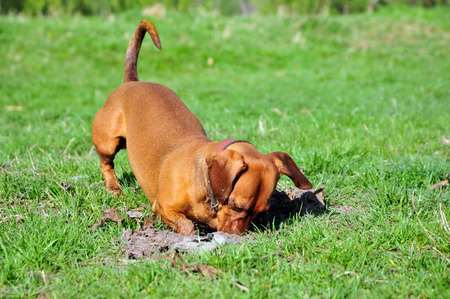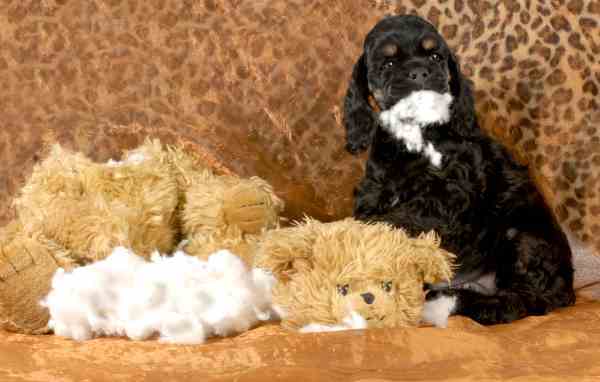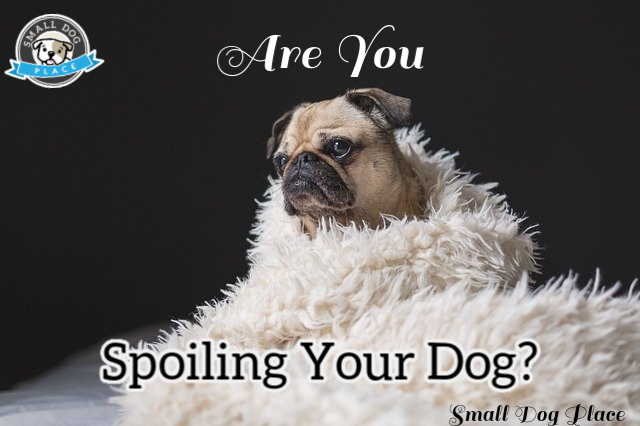- Small Dog Place Home
- Behavior Problems
Dog Behavioral Problems in Small
Dogs: Causes and Solutions
By Susan Combs | Last Updated 04-27-2023
Dog behavioral problems are one of the many reasons people seek help with a dog trainer or animal behavior specialist.
Some are more serious than others. Some problems can be traced back to a genetics and normal canine behavior gone astray.
Others are caused by the environment, either through poor socialization as a puppy, trauma, or simply through owners who have unwittingly encouraged behaviors that eventually become problems.
 Dog Behavioral Problems
Dog Behavioral ProblemsUnless pet owners have been trained, the average dog owner may recognize the behavior problem but have little idea where the problem originated or how they can help their dog overcome or even eliminate the problem.
If you are one of those owners, relax, you are not alone. Most people misunderstand and mishandle their dog’s behaviors.
There are no bad dogs but rather bad owners who have caused certain breeds to be considered aggressive or dangerous. The best thing that you can do is educate yourself about canine behavior before purchasing that puppy that you simply needed to take home.
Understanding the behaviors and signs of problems will make training much easier in the future. Below are common issues that many dogs have and how to solve them in a constructive as well as timely manner.
There are a number of common behavior problems seen in small dogs, some more serious than others.
What are the Most Common Dog Behavioral Problems
10. Excessively Energetic Dogs
11. Timid Dogs
12. How to Gain the Trust of Scared Dogs
13. Are You Spoiling Your Dog?
14. What to Do About Aggression Towards House Guests
15. Dealing with Potty Training Problems
16. Is Your Dog Panting at Night?
1. Aggression: Are small dogs more aggressive?
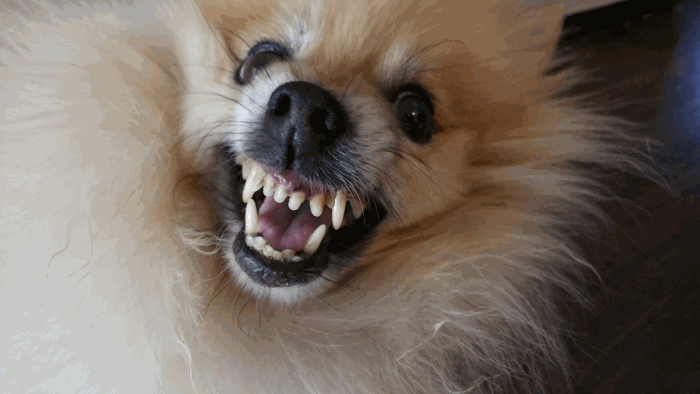 Dog Behavior Problems
Dog Behavior ProblemsAggression in small dogs is one of those dog behavioral problems that is hard to ignore. It has many causes and comes in many different forms.
While there is plenty evidence to suggest a genetic cause, there is even more reason to believe that the environment might have something to do with dogs who are aggressive. Causes and types are discussed as well as some solutions.
Are small dogs more aggressive?
Read more about how to deal with an aggressive dog
2. Barking: How to quiet a yappy dog?
Almost all dogs bark, howl and whine but some small dogs are known for their yappiness.
Excessive barking is a dog behavioral problem -- it is disruptive and annoying, both for you and for your neighbors.
Read more about problem barking behavior
3. Begging: Why does my dog want to steal my food?
Begging is a bad habit, but many small breed dog owners unfortunately encourage it.
This can lead to digestive problems and obesity. Worse yet, it can undermine your role as pack leader.
Read more about how to stop begging at the table.
4. Digging: What can I do about my dog's destructive digging habit?
If given the chance, most dogs will do some amount of digging, it is part of their instinct. Some dogs have been developed to dig burrows to look for rats and other vermin.
What happens when this activity involves digging a hole in your carpet or best rose garden? This is when digging becomes a big dog behavioral problem.
Read more about why dogs like to dig
If Digging is the reason to to escape, you may have bigger issues. Escape artist dogs cannot be trained for the most part to not escape or run for the hills as soon as they slip their leash. Electric fences are useful, but this can be a failure if your dog has sight of a cat or other animal combined with a strong prey drive.
Dogs tend to try to dig under fencing so putting chicken wire a few inches down into the dirt can be a huge help. Once the dog tries to dig once they stop as the wire will stop them without risking any real injury.
5. Destructive Behavior: How can I make my dog stop destroying my furniture?
Destroying the home can be a symptom of separation anxiety as mentioned above, but it can also be due to lack of exercise. Certain breeds need to be worn out for their mischievous side not to shine through.
With this being said locking up trash and other things that dogs commonly tear up is also imperative. The answer to this could be a long walk in the morning before you depart for work.
This is not an option for everyone, but there are reliable dog walking services that can help tire your dog out to the point of not being destructive.
With smart home technology, you can also help as there are things that can play your voice and tell a dog to stop what they are doing. A simple command for even the bravest of dogs that think their owner might be home can be enough.
These common issues can be easily solved with the right training methods. Your dog is a part of your family so remember to have patience with them as it can take time to learn certain things.
Read more about dog destructive behavior
6. Eating Their Own or Others' Poop: Are there ways to stop this disguising habit?
This may be one of the most distasteful behaviors to observe or discover after the fact.
The technical term for eating one's stool is coprophagia and the practice is more of a behavioral problem than a health problem, but there can be some health issues associated with the practice.
Read more about dogs who eat feces
7. Excitement Urination: Why does my dog do this?
 Excitement Urination is common in some puppies.
Excitement Urination is common in some puppies.Excitement Urination and Submissive Urination are two types of urination problems that I have seen sometimes in small dogs. Both are troublesome and discouraging, but there is hope.
While we may not be able to eliminate these problems entirely, we can at least understand why they are happening and what we should and should not do to improve the situation.
Read more about excitement urination
8. Licking: Why does my dog lick everything?
 Why do dogs lick everything?
Why do dogs lick everything?All dogs are a little crazy in their own way, but licking everything in sight is actually more common than you might think.
Carpets, toys, us, themselves – nothing is too dirty or too weird for their appetite, but should you be concerned?
Read more about licking
9. Submissive Urination: Why does my dog pee at my feet?

Inappropriate urination and defecation are among the most frustrating dog behaviors for their human families. They can damage areas of your home and make your dog unwelcome in public places or at the homes of others.
The little piddling that happens when a dog is trying to act submissive can be very annoying. Is there anything we can do about it?
Read more about submissive urination.
10. Super-Energetic Small Dogs: How can I calm them down?
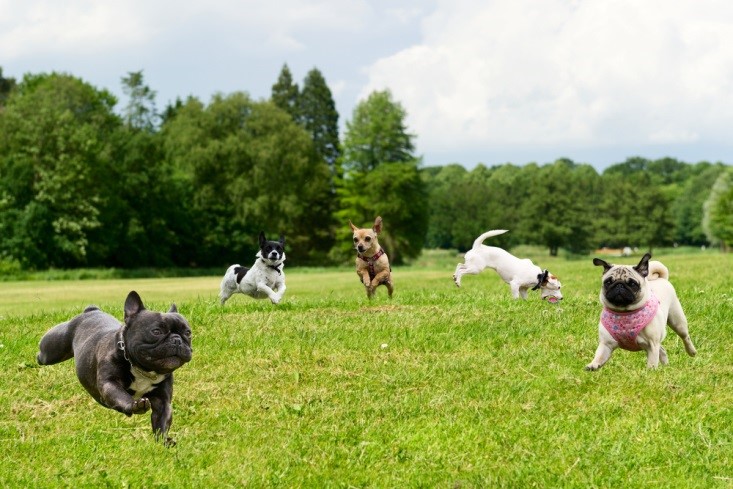 Calming Energetic Small Dogs
Calming Energetic Small DogsHaving more than their share of energy, some highly active small dogs need a little help from us to bring at exuberance down a notch or two.
Having plenty of energy is not a behavioral problem because most of the dogs that fit into this category were breed from the beginning to do a job requiring plenty of energy.
The problem comes when these dogs can not find ways to calm themselves and are working with a high level of adrenaline that can cause damage to the body.
Read more about calming energetic dogs
11. Timid Dogs: How do you train them?
 Training Timid Dogs: What You Must Know
Training Timid Dogs: What You Must KnowTimid dogs often present a huge training challenge. Some are born timid; others are made that way by abusive handling. As fear is the main reason dogs bite, there is no greater nature/nurture nightmare than a genetically timid dog who has been abused. This poor soul is an accident waiting to happen.
The clinically timid dog appears desperate, almost paranoid. This is the puppy in the litter who holds back. He’s the least likely to approach new people and may be reluctant to explore novel things. His fearfulness interferes with his enjoyment of life and, often, our enjoyment of him.
Read more about Training Timid Dogs
12 Proven Ways to Get a Scared Dog to Trust You
Those who adore small dogs love talking about their rambunctious personalities, often making them seem far ‘bigger’ than they are.
Small and big dogs can be scared of various things and experiences for many reasons—including lack of socialization, traumatic experiences, and exposure to loud noises. Empowering them to go through their daily lives (indoors and outdoors) with greater confidence and aplomb is vital to gain a scared dog’s trust is vital.
Read more about ways to get a scared dog to trust you.
13. Are You Spoiling Your Dog: Telltale Signs You May be Guilty
Are you in love with your dog? If you are here, of course, you are!
As a caring and responsible dog owner, developing an affectionate relationship that is based on trust and respect is crucial for its emotional and psychological health.
Read more about Spoiling Your Dog.
14. Aggression Towards House Guests
The worst thing that an owner of a dog can deal with is the dog being nothing but loving to the family in the home only to completely change when guests arrive.
You do not want your guests to be in constant fear of your dog, and you are risking your family’s financial well-being as well as the life of your dog.
A dog that bites someone can be put down or taken from a family, but state laws differ on this with some states allowing one reported dog bite injury with the second leading to euthanasia.
Socializing the dog from a young age is essential as they will think nothing of guests arriving. Introduce your dog in a calm environment to allow the dog to know you are accepting of the guests.
Otherwise, the dog could just be protecting you by showing aggression as you are the leader of their pack.
15. Potty Training Problems
Potty training can be an issue for owners that expect their dog to become potty trained in a matter of days. This is not always the case and getting overly upset can lead this to take far longer.
A dog might hide and go to the bathroom somewhere; it will not be found only to give your home an awful smell. This is going to take dedication as it can be tough to get up early to take your dog out, but it is imperative.
Your dog should know to let you know they have to go to the bathroom in one way or another. Some dogs scratch at the door while others stare/bark at you until they are taken out. Once you have them trained intermittently reward them, so they continue the good behavior.
16. Is Your Dog Panting at Night? Behavior or Health Problem
Panting in dogs is a very healthy thing. You probably already know this if you spend any time with your dog. Panting is a sort of shallow, fast breathing that evaporates the water very speedily from your canine’s tongue, upper respiratory tract, and inside of his mouth.
Author Bio
Susan is a Pet Health and Safety expert. Her specialties include keeping up with important issues regarding pet health and pet care, working closely with pet parents to find answers concerning training, grooming and caring for specific breeds of dog
References and Further Reading on Dog Behavioral Problems
Karen Pryor: Ten Reasons Why Your Dog May Develop Behavioral Problems
About Janice (author and voice behind this site)
Having lived with dogs and cats most of her life, Janice served as a veterinary technician for ten years in Maryland and twelve years as a Shih Tzu dog breeder in Ohio.
Her education includes undergraduate degrees in Psychology with a minor in biology, Early Childhood Education, and Nursing, and a master's in Mental Health Counseling.
She is a lifelong learner, a dog lover, and passionate about the welfare of animals. Her favorite breed for over 50 years has been the Shih Tzu, but she has also lived with Poodles, Maltese, Yorkshire Terriers, Beagles, English Bulldogs, Carin Terriers, and a Cocker Spaniel.
When not writing, reading, and researching dog-related topics, she likes to spend time with her eight Shih Tzu dogs, husband, and family, as well as knitting and crocheting. She is also the voice behind Miracle Shih Tzu and Smart-Knit-Crocheting
Does This Article Deserve Your Thumbs Up?
We always appreciate your support and encouragement. Your thumbs up means so much to us. Please like this article.
If you find this page or any page on Small Dog Place Helpful, or useful in anyway, I'd love it if you would click the small heart found on the bottom right of each page.
You can also share or bookmark this page -- just click on the:

Free Monthly Newsletter
Sign Up for Our Free Newsletter and get our Free Gift to You.
my E-book, The Top 10 Mistakes People Make When Choosing a Dog (and how to avoid them)


